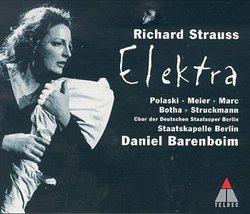| All Artists: Deborah Polaski, Waltraud Meier, Alessandra Marc, Johan Botha, Falk Struckmann, Chor der Deutschen Staatsoper Berlin Title: Strauss - Elektra / Polaski, Meier, A. Marc, Botha, Struckmann, Staatskapelle Berlin, Barenboim Members Wishing: 0 Total Copies: 0 Label: Elektra / Wea Release Date: 6/4/1996 Genre: Classical Style: Opera & Classical Vocal Number of Discs: 2 SwapaCD Credits: 2 UPC: 745099917524 |
Search - Deborah Polaski, Waltraud Meier, Alessandra Marc :: Strauss - Elektra / Polaski, Meier, A. Marc, Botha, Struckmann, Staatskapelle Berlin, Barenboim
 | Deborah Polaski, Waltraud Meier, Alessandra Marc Strauss - Elektra / Polaski, Meier, A. Marc, Botha, Struckmann, Staatskapelle Berlin, Barenboim Genre: Classical
|
Larger Image |
CD Details |
CD ReviewsAny cut version loses 1 star automatically - Barenboim incl. Alexander Z. Damyanovich | Flesherton, Ontario, Canada | 03/22/2002 (4 out of 5 stars) "From hearing the samples, this seemed to be a very winsome recording of the opera. The principals all are most competent, with a beautiful tone-quality with Deborah Polaski in the title-rôle (almost sounds at times like Birgit Nilsson, when heard over the relatively lo-fi sound available through a computer with those small speakers...). The same can be said of Waltraud Meier as Klytämnestra, and the care they pay to the notes they sing definitely reaps lovely results. Barenboim really is a star with his tempi and the grand yet muscular (though also at times ravishing) orchestral sound he gets from the Berlin Staatskapelle. So why does this recording NOT get a full 5-star report? For some unknown reason (excepting Solti and perhaps Sawallisch - and in the case of Solti, he {with the help of recording director John Culshaw and Regina Resnik as Klytämnestra} was barely able to finally cajole Birgit Nilsson into finally agreeing to record the complete version!!), the cuts omitted in most or all live stage-performances keep on being excised from most recordings - and selection 3 from Disc 2 misses some lovely stuff right on the spot. Given that the whole opera is less than two hours long, while cuts may be possibly understandable under live conditions, for recordings they're absolutely _unacceptable_!!!" Here, the conductor is the star 11/11/2003 (5 out of 5 stars) "Barenboim leads the Dresden Staatskapelle in a growling, wholly enthralling reading of Strauss' flawless score. The gripping frenzy of the orchestra under the assured direction of Barenboim is an incredible sonic experience. Elektra's soliloquy has the kind of visceral punch to make you really sit up and take notice. I was totally blown away by this dramatic reading, the urgency unnerving. Deborah Polaski sings the role well (not good enough to erase memories of Behrens, Nilsson or the mighty Borkh), as do the other singers, especially Meier (she's very good, but Resnik owns the role and, therefore, comparison's are inevitable). But as previously stated, in this recording, the orchestra's the one that will make you return time and again. Barenboim is not a consistently gifted conductor, far from it, but when he gets it right, as he does here, it's a wonderful experience. I have no less than four complete recordings of "Elektra" all wonderful, but this one has that kind of raw, rhythmic energy that not even Solti and Bohm managed to produce." Such a Frenzy!!! Guntram | PR,Brazil | 03/05/2003 (5 out of 5 stars) "An inventive,terrific masterpiece like'"Elektra" demands
an qualified performance and here,we have a truly Barenboim GOAL!He hold the bull's horns and relishes the hailstorm of violence and blood in the score.I never,never was a fan of him but just because I have many "Elektras",this one threw me back to the first time I heard the opera.Polaski is a so fierce animal(I'll never marry a woman like she!) and,even when she doesn't sing notes in the precise time, it makes the music even more savage.She sticks top notes courageously and this is so important on her scene with Klytamnestra.I can't describe the Waltraud Meier's performance here.Her big roar on murder scene,so real,...Listen yourself, read Strauss's wishes to this character's interpreter and kneel down yourself at Meier temple.Struckmann has his big voice to sing a princely Orestes,the only decisive male part in whole opera.Guys,five big stars to all of these great artists and,enjoy yourselves all this frenzy!" |

 Track Listings (12) - Disc #1
Track Listings (12) - Disc #1